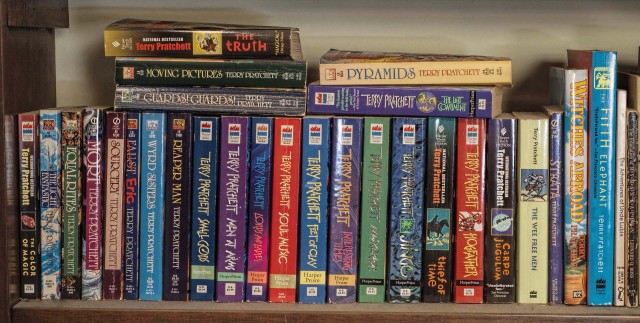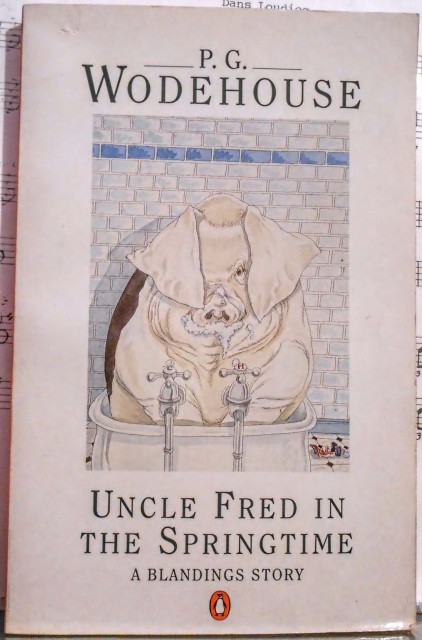Diana Wynne Jones, one of my favorite writers, died Saturday. She is perhaps best known in anime circles as the author of the book Howl’s Moving Castle. ((Available as an audiobook here.)) However, if all you know of Jones is Hayao Miyazaki’s weakest movie, you don’t know Jones at all. Although she herself liked the movie, I found it far inferior to the superb novel, which I highly recommend. I’ve read and re-read a lot of her books; many of them are excellent and all of them are at least good. Some of my favorites include Dogsbody, Fire and Hemlock, Hexwood, A Tale of Time City, Archer’s Goon, The Homeward Bounders, The Dalemark Quartet, ….
Update: Neil Gaiman on Diana Wynne Jones. (Via Steven R.)
Update II: Eve Tushnet on Jones: “As always with Jones, childhood is no refuge.”
Update IIII: Yet another appreciation, this one containing the useful phrase, “unpredictable inevitability.” ((Which encapsulates the difference between Zombie and Madoka, by the way. Things just happen in the former, but in the latter every detail matters and each event, no matter how surprising, is logically connected to everything else and inevitable in retrospect.))
Rather than blather on, I’ll reprint an entry from my first weblog many years ago.
*****
At a used bookstore this afternoon I spotted Diana Wynne Jones’ The Tough Guide to Fantasyland. Should you ever find yourself on a tour in Faerie, you will find it handy.
Apostrophes. Few names in Fantasyland are considered complete unless they are interrupted by an apostrophe somewhere in the middle (as in Gna’ash). … No one knows the reasons for this. Nor does anyone really know how an apostrophe should be pronounced, though there are theories:
1. You ignore the apostrophe and simply pronounce the word. (Here Gna’ash = Gnash.)
2. You leave a gap or lacuna where the apostrophe appears. (Here Gna’ash = Gna-ash.)
3. You make a kind of clucking-sound to stand for the apostrophe. (Here Gna’ash = Gnaglunkash.) Persons with insecurely mounted tonsils should adhere to one of the other two theories.
Bath is something all Tourists crave for quite soon. After very few days of slogging along in all weathers and sleeping in your clothes, you will be ready to kill for a Bath. You will crave to wash your hair. The management is reasonable on this issue. Before long you will find wither a deep POOL in a RIVER of icy water (“icemelt;” see also HYPOTHERMIA, COMMON COLD and CHILBLAINS) or an INN with a heated bath-house. You will be able to leave your clothes, money, weapons and SECRETS on the bank or bath-house bench and wash in perfect safety. Management Rules state that no one ever steals your clothes/valuables or AMBUSHES you while you are immersed in a Bath.
Common Cold. this is one of many viral nuisances not present. You can get as wet, cold and tired as you like, and you will still not catch cold. But see PLAGUE.
Costume. It a curious fact that, in Fantasyland, the usual Rules for CLOTHING are reversed. Here, the colder the climate, the fewer the garments worn. In the SNOWBOUND NORTH, the BARBARIAN HORDES wear little more than a fur loincloth and copper wristguards (see CHILBLAINS and HYPOTHERMIA). However, as one progresses south to reach the ANGLO-SAXON COSSACKS, one finds VESTS and BOOTS added to this costume. Further south still, the inhabitants of the VESTIGIAL EMPIRE wear short SKIRTS and singlets and add to this a voluminous wrapper on cold days. Thereafter, clothing steadily increases in thickness and quantity, until one finds the DESERT NOMADS in the tropics muffled to the eyebrows in layers of ROBES (see HEATSTOKE).
… In fact, Elves appear to have deteriorated generally since the coming of humans. If you meet Elves, expect to have to listen for hours while they tell you about this — many Elves are great bores on the subject — and about what glories there were in ancient days. They will intersperse their account with nostalgic ditties (“songs of aching beauty”) and conclude by telling you how great numbers of Elves have become so wearied with the thinning of the old golden wonders that they have all departed, departed into the West. This is correct, provided you take it with the understanding that Elves do not say anything quite straight. Many Elves have indeed gone West, to Minnesota and thence to California, where they have great fun wearing punk clothes and riding motorbikes.
Sing is used in a technical sense. This is because MUSIC is so powerful in Fantasyland that no one can really just sing a SONG without risking a Magical result.
The most frequent use of Singing is to speed a dead person’s soul on its way. On some tours no one is properly dead without it (see UNDEAD). Otherwise, Singing is an invocation, a SPELL, or a way of summoning nature MAGICS for some purpose. Tourists shoud be careful to avoid humming a casual tune. You may find you have summoned an ELEMENTAL, a STORM, or a selection of GODDESSES AND GODS.
Socks are never worn in Fantasyland. People thrust their feet, usually unwashed, straight into BOOTS.
There’s a lot more, including six pages on the various kinds of enchanted swords (be sure to have a qualified magician inspect a blade, just as you would have a mechanic look at a used car you’re thinking of buying). Jones’ lexicographical exercise subsequently resulted in her novel Dark Lord of Derkholm.








